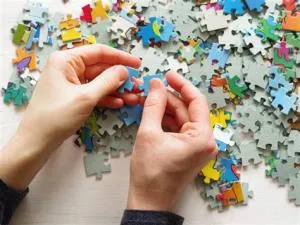Why are puzzles good for problem-solving?

Who are puzzles good for?
Studies have shown that jigsaw puzzles can help improve visual-spatial reasoning, short-term memory, and problem-solving skills as well as combat cognitive decline, which can reduce risk of developing dementia. There are also mental health benefits to puzzling.
2024-01-03 11:57:54
Do puzzles count as problem solving?
Puzzles develop memory skills, as well as an ability to plan, test ideas and solve problems. While completing a puzzle, children need to remember shapes, colours, positions and strategies to complete them.
2023-11-25 19:49:36
Are puzzles good for my brain?
Working on a puzzle reinforces connections between brain cells, improves mental speed and is an effective way to improve short-term memory. Puzzles increase the production of dopamine, a chemical that regulates mood, memory, and concentration. Dopamine is released with every success as we solve the puzzle.
2023-09-17 22:16:42
Do puzzles count as problem-solving?
Problem solving skills
Sitting down with a puzzle is a great way for children to develop problem-solving skills. Playing with puzzles encourages children to find the correct piece for each space and look for solutions to their problems, either by matching colours or patterns together.
2023-05-27 02:14:50
- what is svartalfheim
- how many missions are on gta 5
- fortnite planes
- wii gaming consoles
- what happens to finn and jake
- Recommended Next Q/A:
- How do i play music in unity?



